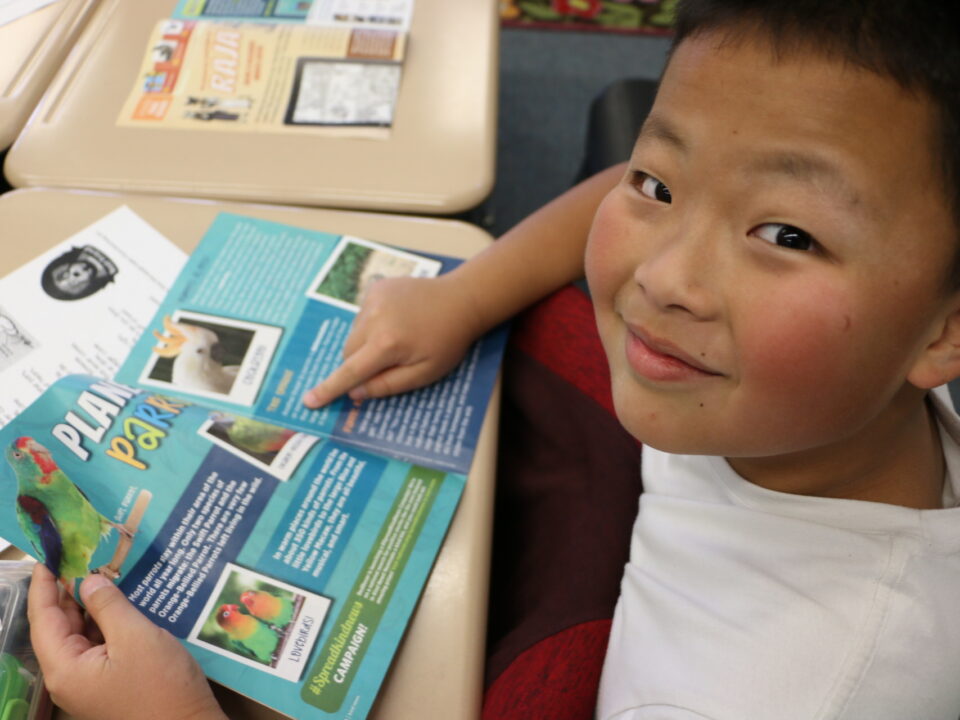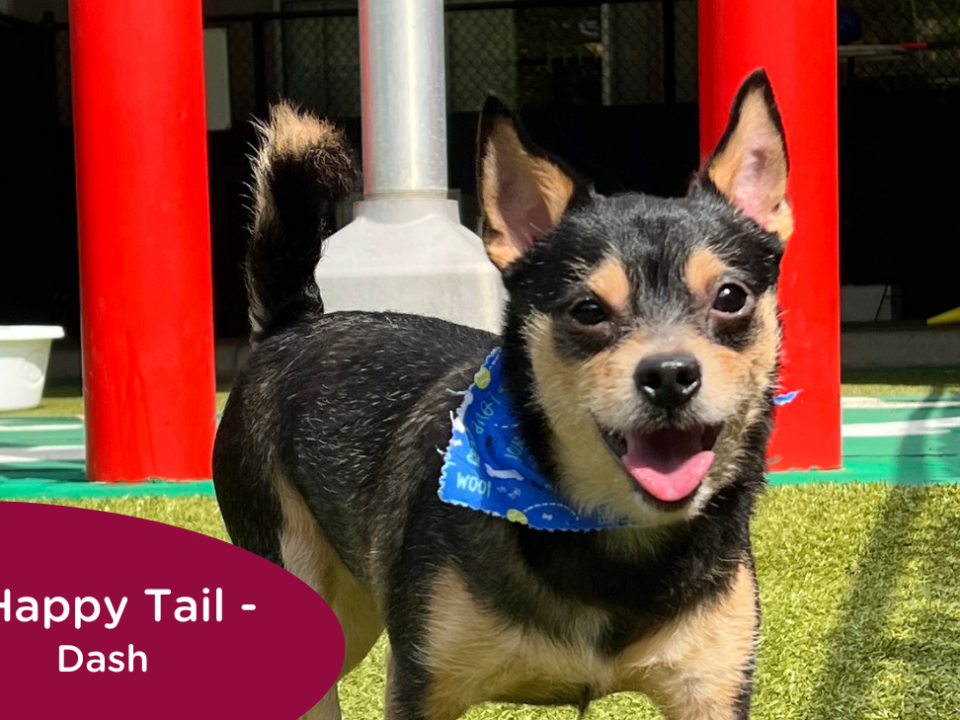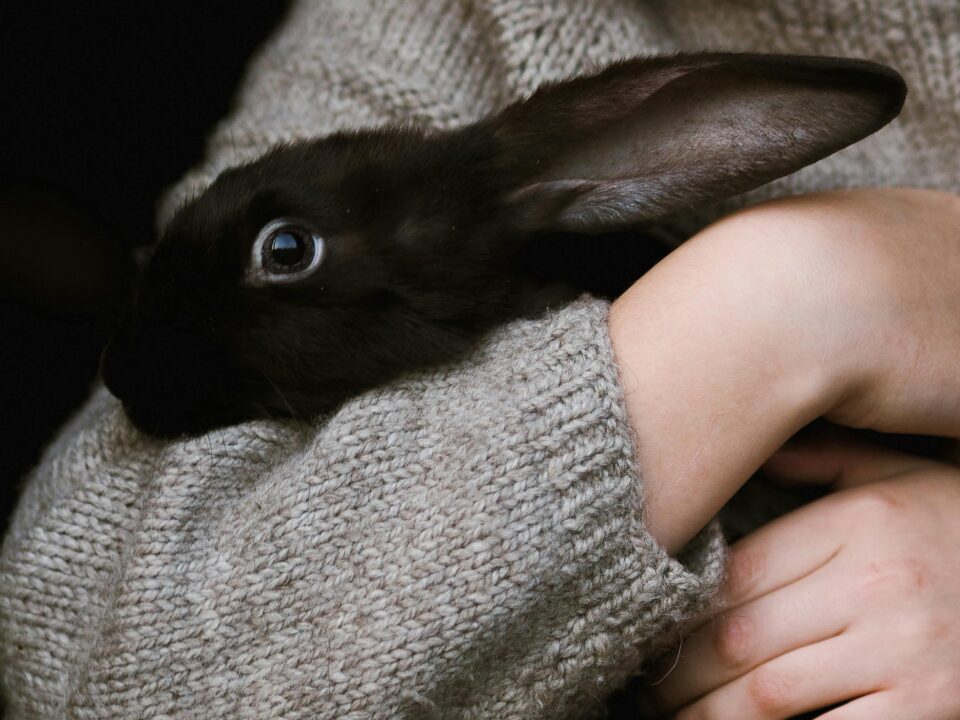Changing the landscape for human and animal well-being: Collaborating with Detroit’s Dog Aide
November 15th, 2022
By Helia Zarkhosh, Communications and Marketing Coordinator II
It’s not an exaggeration to say that human and animal well-being are inextricably linked. Where there is human suffering, you’ll also find animal suffering, and vice versa. This link is apparent anywhere animals and humans coexist, but this fall I witnessed the reality – and the heroic efforts to enact change – in Detroit, Michigan.
A lifeline in America’s poorest city
Extreme hardship is widespread in Detroit. In this 140-square-mile city, the poverty rate is a staggering 33.2%. It’s difficult to fathom that one-third of the entire city’s population is living below the poverty line. Detroit remains the poorest large city in the country, according to Forbes. Needless to say, many residents are desperately struggling to survive.
As is the case for millions of Americans living in poverty, being a lower-income individual in Detroit can mean living in a food desert, struggling to pay rent and utility costs and unable to qualify for a mortgage, thus robbed of the opportunity to build wealth or equity.
Organizations that provide much-needed assistance to the city’s residents are nothing short of a lifeline. I was fortunate enough to meet one such organization on a deployment with the RedRover Responders team. Established in 2012, Dog Aide’s mission is to provide assistance to dog owners throughout the city of Detroit who are experiencing financial hardship – and the need is vast. Through their Community Outreach program, volunteers provide food, daily care items, education on pet care, access to free or low-cost veterinary care (including spay/neuter), and more. As their website explains: “‘Aid’ is a verb, while ‘Aide’ is a noun. Dog Aide isn’t just what we do, it’s who we are.”
To date, Dog Aide has provided over one million bowls of dog food, spayed/neutered 1,800 animals, and since their Operation Freedom program began in 2021, they have unchained and provided secure enclosures to 36 dogs. Through my interactions with their board and volunteers and experiencing their work in action, I can attest to just how incredible this organization is. Their compassion goes beyond animals – because, like RedRover, Dog Aide recognizes that human and animal well-being are deeply intertwined.
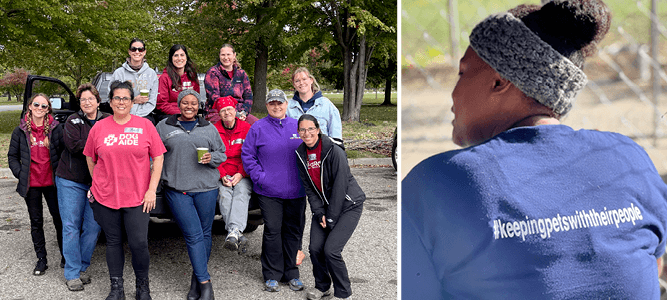
Over the course of this two-day deployment in October, our teams united to build safe, secure enclosures for 10 dogs who live outdoors either part-time or full-time, so they can enjoy an improved quality of life off a chain, and their families can experience peace of mind. Dog Aide’s program provides each dog with a new igloo for shelter, straw for warmth, lightweight tie-out, food, bowls, collars, enrichment items, treats, preventive medicine, and free spay/neuter. This is a huge undertaking for such a small nonprofit. I spoke with several board members, current volunteers, and residents to learn more about the hardships low-income Detroit residents face and how Dog Aide aims to address problems by getting to the source.
Institutionalized poverty in Detroit
We drove miles and miles throughout the city without seeing anything other than gas stations and liquor stores. Where were the grocery stores? The healthcare facilities? Anything that would meet the daily needs of residents? Countless businesses had been shuttered over the years, leaving hardly any resources for the residents in these areas. With so many living in food deserts, unable to manage the cost of transportation, living in poorly maintained homes – and many without heat, internet, or other utilities I take for granted – at one point I thought, “It’s as if the city forgot about these people.”
It’s no coincidence that the most impacted residents in these areas are people of color. The U.S. Census estimates Detroit’s Black population to be around 77%, and the history of Black people in Detroit dates as far back as 1736, with roots that begin (as is the case for most of the country) in slavery, then expanded during the Underground Railroad and the Great Migration. The enforcement of Jim Crow, ongoing housing shortages, and continued practices of housing discrimination like redlining ensured that white neighborhoods would remain white, while prospering Black neighborhoods would get demolished, forcing residents further and further away from thriving economic centers. The effects of such blatant racism are still very much present today.
As the animal welfare field and RedRover, in particular, make strides towards dismantling racism within pet care and animal well-being, organizations like ours can’t ignore the historical context of racism that has contributed to compromised human well-being.
Bridging the gap
RedRover’s Community Programs initiative was created to help address the inextricable link between human and animal well-being. One of the pillars of our approach to these projects, which include unchaining dogs and supporting free/low-cost pet clinics, is to meet people where they’re at. Our intention is to center and address the specific needs of individuals and communities, engaging through a lens of understanding and compassion rather than judgment and condemnation. We recognize that a one-size-fits-all system simply does not work and that sometimes long-term change requires time, resources, and smaller steps in order to be sustainable.
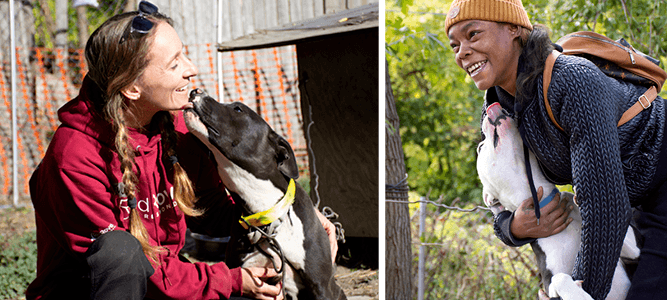
There are many reasons dogs in cities like Detroit and Bennettsville, South Carolina (where we’ve previously deployed for unchaining projects), live outside, and it’s important to understand all of the factors – including systemic barriers – when we’re making connections, establishing partnerships, and building trust within communities. Often, large dogs are not allowed inside due to landlord or housing restrictions, and it isn’t possible for families to move elsewhere. I’ve also seen multi-generational families living together in very small spaces, sometimes with multiple dogs or other companion animals who don’t get along. There are often cultural differences in the use of dogs for protection, and in some cases, a belief that dogs prefer being outside. It’s important to keep in mind as well that there are cultural differences between how people in the United States house and care for companion animals versus global norms. Globally, 70% of dogs are free-roaming and have much more autonomy and the freedom to meet their genetic needs by not being housed indoors.
See our deployment Facebook album >>
To better understand and meet the specific needs of different communities, RedRover considers the community as a whole, as well as the circumstances of an individual pet owner. This process starts with recognizing the vast range and variety of approaches to animal care. The way I am able to care for my pets is often not feasible or appropriate for the families we serve. As a national organization, it’s important that we partner with local groups that have roots in and are trusted by the communities they serve. In these collaborations, our assistance addresses the immediate needs of a community or family and enables organizations to complete projects over the course of a few days that may otherwise take months.
In bridging the gap between people and services, these partners offer unchaining programs that don’t end with building an enclosure. We know that the path towards becoming a more humane community is through building relationships, trust, and collaboration, which is what we look for in the community outreach programs we partner with. Once a family and their pets are in these programs, they are part of the life-long community outreach relationship that includes services to keep pets healthy. These services include spay/neuter, vaccines, preventive medication, enrichment, kennel cleaning, enclosure maintenance, and education.
Keeping pets with their families
The families in these programs reach out because they want better for their pets. As an animal control officer and former shelter manager, RedRover’s Field Services Community Programs Manager Devon Krusko knows firsthand that removing dogs from chains and separating them from people who love them doesn’t solve the issue of unmet animal needs:
“This is different from animals who must be removed because of cruelty and neglect.
“We know that people will have pets, including those who keep them outside, regardless of our involvement. Shelters and animal control entities in these communities do not have the staff or capacity to remove every dog who lives outside. When those dogs are removed, another one takes their place. Rather than take a pet away from a family, we focus on reducing harm, improving quality of life, and helping families provide appropriate care and housing, like the enclosures you’ve seen in our unchaining campaigns. This support allows families to feel comfortable asking for additional help, which sometimes includes surrendering an animal, financial assistance for medical needs, or training.”
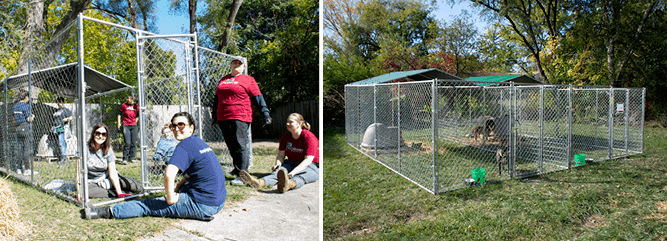
While it is true that dogs who live outside may not receive the same type of care and enrichment opportunities as my dog, it does not mean that they are any less loved. Having met and interviewed many of the families we’ve helped build enclosures for, it’s plain to see that their bonds with their animals are incredibly meaningful and important to them – just as my bond is with my pets.
It’s also clear that these outreach programs make a different reality possible for people who are struggling to meet their own basic needs, and therefore struggle to meet the needs of their pets. Everyone, no matter their financial circumstance, is deserving of the companionship of an animal, along with peace of mind that help is out there when they are unable to make ends meet.
I’m incredibly proud of our collaborations with organizations like Dog Aide, and honored to work alongside people who are so dedicated to fundamentally changing the landscape of human and animal well-being in their communities.

